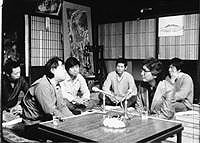A Visit to Ogawa Productions is included on the same DVD as Red Persimmons
In 1981 film director Nagisa Oshima - the 'New Wave' Japanese director best known in this country for films such as Cruel Story of Youth (1960), In the Realm of the Senses (1976), and Merry Christmas, Mr. Lawrence (1983) - traveled to the Yamagata countryside to visit the documentary filmmaking collective led by Shinsuke Ogawa (1935-1992), who was then in the midst of filming A Japanese Village - Furuyashikimura, a feature-length documentary chronicling the seasonal cycle of rice growing.
Ogawa, who produced Summer in Narita (1968), Peasants of the Second Fortress (1971), and Red Persimmons (2004), gives Oshima a brief tour of their rural location, including the rice fields they are cultivating as well as filming, and introductions to local villagers. They then settle down for a wide-ranging conversation about Ogawa Productions' approach to documentary filmmaking - that of self-styled "film nomads" who live and work for extended periods of time in various regions of the country-focusing in particular on their current production, which involves an intimate interaction over a period of several years with local farmers, weather conditions, the environment, and aspects of village life.

A VISIT TO OGAWA PRODUCTIONS thus offers a rare insight into the social and cinematic philosophy of one of Japan's best-known documentary film collectives. As the film reveals, Ogawa Productions' in-depth portraits of Japanese society - whether of protest movements or traditional agricultural life - grew out of an unusual commitment to integrate themselves with the communities they filmed, to the extent that their filmmaking literally became an alternative lifestyle.
"Wonderful! An excellent resource. Rich and complex... Marvelous!"—Visual Anthropology Review
"A truly in-depth look at the mastery of a great documentary film artist. Much of Ogawas motivation for creating his documentaries comes from his own sense of duty to the preservation of cultural traditions. This film is very sensitive in the way in which it portrays Ogawa's enthusiasm and his philosophical outlook, which is reflected in his feelings for the environment, all of humanity, and the rich precision of his art."—Leonardo: The Journal of the International Society for the Arts, Sciences and Technology
"Offers unique insight into the way [Ogawa's] filmmaking collective functioned. Composed of a series of wide-ranging interviews with Ogawa on social activism in the 1960s and 1970s, his interest in rural life, and his philosophy of shooting. Ogawa contextualizes the transition between his early work on the student/farmer/union protests and his later gentler exploration of rural life in terms of his interest in understanding the connection between farmers and their land that he saw while shooting at Sanrizuka/Narita.Based on close participant-observation, Ogawa's films reflect both the scientific as well as humanistic dimensions of his filmmaking philosophy. Fascinating!"—Karen Nakamura, Asst. Professor of Anthropology, Yale University, for Visual Anthropology Journal
"Recommended! Compelling! Infectious and... inspiring."—Educational Media Reviews Online
2005 Association for Asian Studies Film Festival
2004 Hong Kong International Film Festival
2003 Berlin International Film Festival
